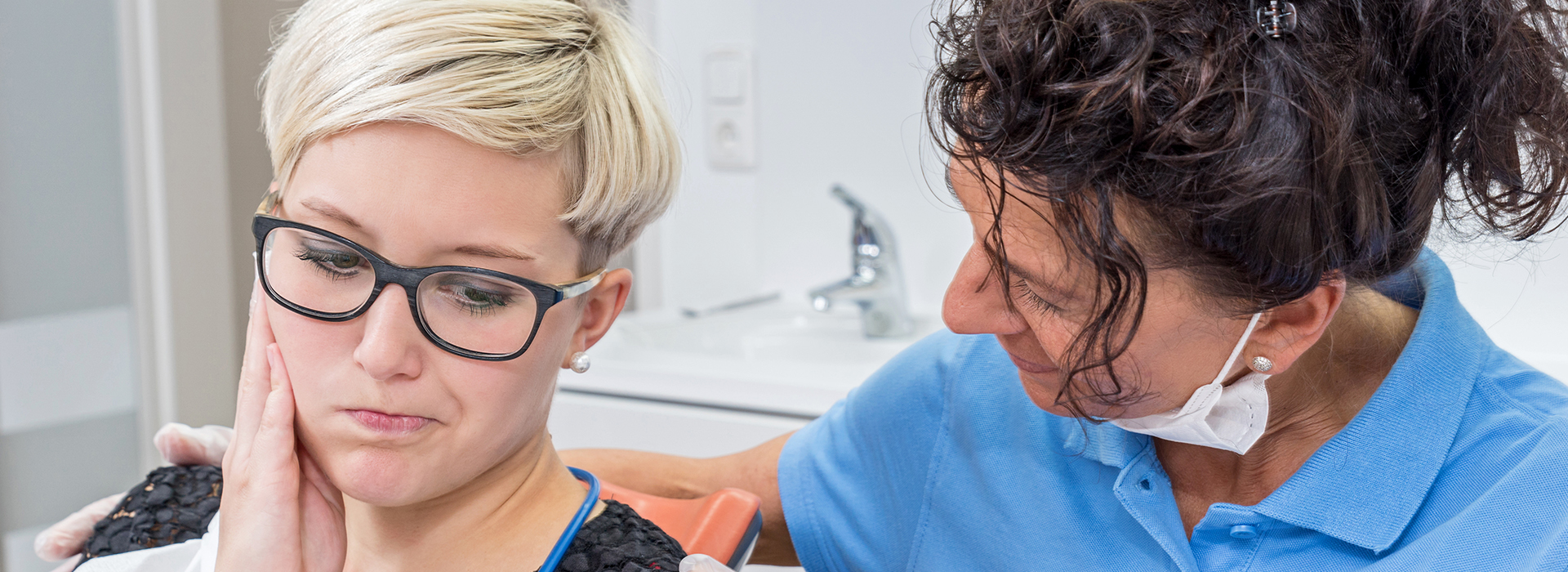
Dental pain and oral injuries run a wide spectrum — from minor irritation to situations that require immediate attention. If you or a family member experience sudden, severe tooth pain, uncontrolled bleeding in the mouth, a knocked-out tooth, or swelling that affects breathing or swallowing, those are clear signs to seek emergency care right away. Early recognition and timely intervention often mean the difference between saving a tooth and needing more extensive treatment later.
Not every ache warrants a same-day visit, but patterns matter: persistent throbbing that wakes you from sleep, fever with facial swelling, or visible bone or tooth fragments all indicate escalating risk. Even if the problem seems contained, changes over 24 to 72 hours — increasing pain, spreading swelling, or difficulty opening the mouth — suggest an active infection or structural damage that should not be ignored.
Children and older adults may show different symptoms and can deteriorate more quickly, so err on the side of caution when someone vulnerable is involved. If you’re unsure how serious the issue is, a prompt professional evaluation can clarify the urgency and allow us to prioritize care that protects your health and comfort.
When you arrive, the first step is a focused, efficient evaluation to identify immediate risks — airway compromise, severe bleeding, or signs of spreading infection take precedence. We use a combination of a clinical exam, patient history, and, when needed, digital imaging to get a clear picture of the problem. This approach lets us make informed choices quickly and safely.
Pain control and infection management are central to early treatment. Our immediate measures may include local anesthesia for painful procedures, temporary restorations to protect exposed tooth structure, and medication recommendations to manage infection and inflammation. Stabilizing the situation reduces discomfort and prevents further damage while we plan definitive care.
Clear communication is part of stabilization. We’ll explain findings and immediate options in plain language, outline the next steps, and set expectations for follow-up. This helps patients feel informed and reduces anxiety during what can be a stressful experience.
Many urgent dental visits are for a handful of recurring problems: severe toothaches, fractured or chipped teeth, lost or damaged restorations, abscesses, and problematic wisdom teeth. Each condition has a pragmatic treatment pathway based on severity. A minor chip might be smoothed and bonded; a cracked tooth that threatens the nerve may require root canal therapy or a protective crown.
An abscess — a localized pocket of infection — is treated with drainage when necessary, appropriate antibiotics when an infection is present, and definitive care to eliminate the source, such as a root canal or extraction. For knocked-out teeth, immediate action dramatically improves the chance of reimplantation; ideally the tooth is replanted within an hour, and prompt professional care is essential.
For broken or dislodged restorations (crowns, fillings, or dentures), we focus first on protecting exposed tooth structure and alleviating pain. Temporary fixes can restore function and comfort quickly, giving time to plan longer-term restorative work. Throughout, our goal is to preserve teeth whenever reasonable and restore reliable chewing function and aesthetics.
Preserving natural teeth is often the priority because keeping tooth structure supports long-term oral health. Modern endodontic techniques make root canal treatment a highly predictable option when the nerve is involved, allowing patients to retain their teeth with minimal ongoing symptoms. When a crown is required after root canal therapy, it protects the tooth from fracture and restores function.
However, there are situations where extraction is the most responsible course — for instance, when a tooth is fractured below the gum line, severely infected and non-restorable, or when it compromises surrounding tissue. Even then, extraction is only a step toward rebuilding a stable bite and smile. We discuss evidence-based replacement options so patients can make informed decisions aligned with their goals and health.
Contemporary tooth-replacement solutions, from implant-based restorations to bridges and removable options, allow predictable recovery of form and function. The choice depends on clinical factors and patient preferences; we provide clear explanations of the expected outcomes and timelines so you know what to expect after emergency treatment.
Managing a dental emergency doesn’t end when the pain subsides. Careful aftercare instructions reduce complications and speed recovery: how to care for a temporary restoration, what foods to avoid, recommended oral hygiene practices, and signs that should prompt another visit. We prioritize clear, practical guidance so patients can protect their healing tissues and reduce the chance of recurrence.
Pain and infection control are guided by safe, evidence-based recommendations. When medications are needed, we discuss what to take, for how long, and possible side effects. Follow-up scheduling is coordinated to complete definitive care — whether that’s a restoration, root canal, or extraction site management — and to monitor healing until the situation is resolved.
Prevention is an important part of our emergency program. Simple steps — wearing a properly fitted mouthguard during sports, addressing small cracks and cavities before they worsen, and keeping up with routine exams — are practical ways to reduce the likelihood of future urgent visits. If you have a history of dental trauma or recurring problems, we work with you to develop a plan to lower risk and improve resilience.
When a dental emergency happens, prompt, coordinated care restores comfort and protects long-term oral health. Our emphasis is on fast assessment, effective short-term measures to stabilize the condition, and a clear plan for definitive treatment. We combine clinical experience with modern diagnostic tools to make decisions that are in your best interest.
Patients can expect a respectful, patient-centered approach that balances clinical priorities with personal concerns — we explain options and support informed choices throughout the process. Whether the situation calls for repair, root canal therapy, or extraction and replacement planning, we aim to restore function, relieve pain, and preserve oral health with as little disruption to daily life as possible.
If you’re dealing with a dental emergency, the practice is prepared to evaluate and treat urgent needs with compassion and expertise. For more information about how we handle emergencies or to discuss an existing concern, please contact us for further assistance.


Pain is your body's way of signaling that something is not quite right and though there are many reasons for oral pain, one of the most common complaints and reasons for seeking urgent dental care is a toothache. Whether you simply need a dental filling, a crown, or require a root canal procedure to save your tooth, we'll alleviate your discomfort and restore the look and function of the involved tooth.

Dental trauma can result in a defect as minor as a small chip in tooth enamel to a more extensive and painful crack or fracture. With sufficient force, a tooth can even be displaced or completely knocked out of its socket. With prompt emergency care, many injured teeth can be restored and saved.

The last teeth in your mouth to develop, wisdom teeth often do not have enough room to fully erupt or may be positioned in the wrong direction. These issues can affect your dental health as well as overall well-being. Our office provides skilled care to address the complications caused by problematic wisdom teeth.

A broken or lost dental prosthesis or restoration can cause embarrassing gaps in your smile as well as compromise your ability to eat and speak with ease. If you've lost or broken a dental filling, denture, crown, or other dental appliance, you can rely on our office to perform a prompt repair or provide a durable and cosmetically pleasing replacement as quickly as possible.
At the office of Cherokee Smiles Dental, emergency appointments are always available. Of course, in addition to providing top treatment for dental emergencies, we also welcome patients searching for high quality and affordable care. We offer a complete range of the latest and best cosmetic and dental services for every member of your family.
If you are suffering from a toothache or have sustained a dental injury, it is important to visit the dentist as soon as possible before more serious complications arise. Whether your dental emergency is painful, if it affects the appearance of your smile, or if you suspect that an infection is present, our office will make every effort to see you as promptly as possible for care.
At the office of Cherokee Smiles Dental, we treat your dental emergency as our top priority. Our caring team will respond to your emergency call right away, making sure you get the gentle, state-of-the-art care you need without delay.
As your trusted emergency dentist in Woodstock, we provide the highest quality of care to mitigate the stress, anxiety, and discomfort of dental problems. Our dedicated team will help you start feeling better as soon as we receive your emergency call.
At the office of Cherokee Smiles Dental, we provide skilled and experienced care to effectively resolve a broad range of dental emergencies, restoring a patient's oral health while protecting their overall wellbeing.
However, even so, specific dental emergencies pose significant threats to one's health. These situations require immediate, emergency room care. Serious and potentially life-threatening dental emergencies include significant oral and facial trauma such as jaw fractures, deep wounds or lacerations to the face and mouth, an abscess or infection that causes widespread facial or submandibular swelling, or affects breathing and swallowing.
At the office of Cherokee Smiles Dental, we provide prompt, skilled, and experienced care to address dental emergencies. We understand that finances are always a concern and do our best to provide options in care that are both affordable and respect your budget.
Once we've had the opportunity to examine your smile, we can give you a clear picture of any existing dental issues, along with a quote for what the cost of treatment will be. The cost of care all depends upon the extent and complexity of issues affecting the health or appearance of your smile and the types of procedures that are required.
To help alleviate any additional stress or delay, you can count on our staff to work with you to optimize coverage for your dental care and to minimize your out-of-pocket expenses. For patients without insurance, we strive to make things easier as well! We invite you to visit our financial information page or speak to an expert in our business office.
Dental emergencies are often painful and debilitating experiences. For this reason it's important to have an emergency dentist in Woodstock, who welcomes patients with urgent dental needs while providing the prompt care required to restore oral health.
Here are just some of the reasons why so many patients choose our office for emergency dental care and to meet their family's dental needs:
We're dedicated to helping patients enjoy good oral health and beautiful smiles. We look forward to helping you keep your smile in tip-top condition. You can rest assured that our highly skilled office team will provide you the highest quality of state-of-the-art dental care and have you smiling again in no time!
To make an appointment or for more information on our office and the many state-of-the-art services we provide, give us a call today.
Sudden, severe tooth pain, uncontrolled bleeding, a knocked-out tooth, or swelling that affects breathing or swallowing are clear signs of a dental emergency. Persistent throbbing that wakes you from sleep, fever with facial swelling, or visible bone or tooth fragments also indicate escalating risk. When in doubt, err on the side of prompt evaluation to reduce the chance of permanent damage.
Not every ache requires same-day care, but changes over 24 to 72 hours—such as increasing pain, spreading swelling, or difficulty opening the mouth—should raise concern. Children and older adults can deteriorate more quickly, so take symptoms in vulnerable people seriously. A professional assessment helps determine urgency and the most appropriate next steps.
If a permanent tooth is knocked out, handle it by the crown and avoid touching the root to preserve vital cells. Rinse the tooth gently with water if dirty, try to reinsert it into the socket if possible, or keep it moist in milk or the patient’s saliva and seek dental care right away. Reimplantation is most successful when performed within an hour, so rapid action matters.
Avoid scrubbing the tooth or using disinfectants on the root, and do not delay seeking professional treatment even if you have temporarily stored the tooth. The dentist will assess the socket, take radiographs, and often stabilize the tooth with a splint if reimplantation is viable. Follow-up visits are needed to monitor healing and tooth vitality over time.
At Cherokee Smiles Dental we begin with a focused, efficient evaluation that prioritizes airway integrity, severe bleeding, and signs of spreading infection. The assessment includes a targeted history, clinical exam, and digital imaging when indicated to clarify the problem quickly and safely. This triage process identifies immediate risks and helps set priorities for treatment.
Based on the findings, we stabilize the situation using pain control, temporary restorations, or medication recommendations as needed. Clear communication about the diagnosis and short-term plan is provided so patients understand the next steps. Follow-up scheduling for definitive care is arranged while the immediate concern is addressed.
Pain relief often begins with local anesthesia for procedures and may include recommendations for appropriate analgesics to manage discomfort at home. When an infection is present or spreading, antibiotics can be prescribed as part of a broader treatment plan, and incision and drainage may be performed for localized abscesses. These measures reduce symptoms and limit further tissue damage while definitive care is planned.
Temporary restorations or protective coverings help shield exposed tooth structure and prevent additional pain between visits. We discuss medication use, expected effects, and potential side effects so patients know what to expect. Timely follow-up is essential to complete restorative or endodontic treatment and to confirm resolution of infection.
Many painful teeth can be preserved with modern endodontic treatments such as root canal therapy when the nerve is affected but the tooth structure remains restorable. A protective crown or other restoration is often recommended after endodontic treatment to prevent fracture and restore function. Saving the natural tooth is typically preferred because it supports long-term oral health and jawbone integrity.
Extraction becomes the most appropriate option when a tooth is fractured below the gum line, severely infected and non-restorable, or when it jeopardizes surrounding tissue. When extraction is necessary, we discuss evidence-based replacement options to rebuild a stable bite and smile. Definitive planning ensures the best outcome for function and esthetics moving forward.
Protect exposed tooth structure by avoiding hard foods and by covering sharp or sensitive areas with temporary dental materials available at most pharmacies until you can be seen. Save any fragments or the restoration and bring them to the appointment if possible, as they can sometimes be used or provide helpful information for repair. Avoid attempting complex home repairs that could make professional restoration more difficult.
At the office we focus first on relieving pain and protecting the tooth with a temporary restoration or smoothing rough edges to prevent soft-tissue injury. A plan for a durable repair or replacement is then developed based on the condition of the tooth and surrounding structures. Timely definitive care preserves function and reduces the risk of further damage.
An abscess is treated promptly to control infection and prevent spread; treatment may include drainage when appropriate and a course of antibiotics when systemic involvement or spreading infection is present. Definitive care targets the source of the infection, which often means root canal therapy to remove infected tissue or extraction if the tooth cannot be saved. Imaging helps define the extent of infection and guides the treatment approach.
Patients are given clear instructions about wound care, pain management, and signs that require urgent reassessment, such as worsening swelling, fever, or difficulty breathing. Severe or rapidly spreading infections may require coordination with a hospital or medical team for intravenous antibiotics and airway monitoring. Close follow-up ensures the infection resolves and that definitive restorative steps are completed when safe.
Parents should stay calm, assess the child’s airway and breathing, and control bleeding with gentle pressure if needed while avoiding excessive manipulation of teeth. For knocked-out permanent teeth follow adult guidance on handling and storage, but for primary (baby) teeth reimplantation is generally not recommended; seek professional advice for the best course. If a child has swelling, fever, or persistent pain, obtain prompt dental evaluation because children can deteriorate quickly.
Comfort measures such as cold compresses and age-appropriate pain relievers can help manage symptoms on the way to the dentist, but do not give aspirin to children. Bring any fragments or displaced teeth to the appointment and be prepared to describe how the injury occurred. The dentist will assess for fractures, infection risk, and need for protective treatment or observation.
After emergency treatment follow instructions about oral hygiene, diet, and activity to protect healing tissues; soft foods and gentle cleaning around the treated area are commonly advised. Use prescribed medications as directed and be aware of potential side effects or signs of adverse reaction. Avoid smoking and strenuous activity while tissues are healing, as these can impair recovery.
Keep all scheduled follow-up visits so the dentist can complete definitive treatment and monitor healing progress. Report any increasing pain, fever, persistent swelling, or drainage promptly, as these may indicate complications. Proper aftercare and timely completion of restorative work help prevent recurrence and restore full function.
Prevention focuses on maintaining routine dental care, addressing small cracks and cavities early, and using protective gear such as a properly fitted mouthguard during sports and recreational activities. Regular examinations and timely restorations lower the likelihood that a minor problem will turn into an urgent one. Good daily hygiene and attention to early warning signs also improve resilience against sudden issues.
The practice at Cherokee Smiles Dental can help you develop a personalized plan that targets your risk factors and recommends practical steps to protect your teeth. This plan may include custom mouthguards, periodic monitoring of known weak teeth, and scheduling prompt care when new symptoms appear. A proactive approach reduces disruption and preserves long-term oral health.

Need to schedule an appointment or have questions about our services?
Our friendly team makes it easy to get the care you need. Whether you call or submit our online form, we’re here to guide you every step of the way.
Don’t wait to start your journey to a healthier, brighter smile—contact us today and experience personalized dental care you can trust.